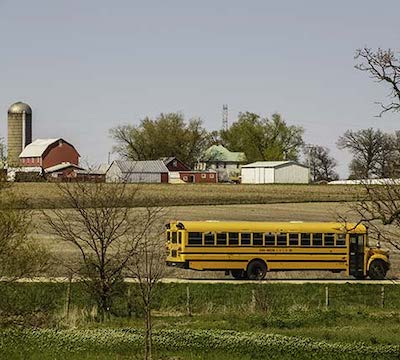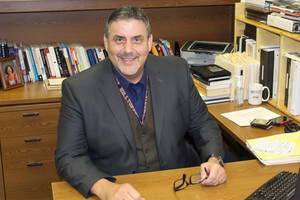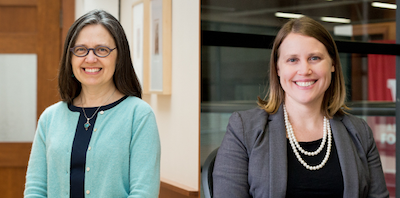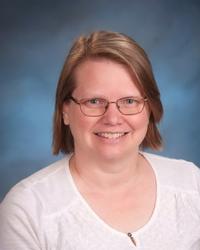Tim Raymond knows all too well the challenges rural school districts in Wisconsin can face in filling open teaching positions — especially in high-need subject areas like special education.
Three years ago, following the retirement of a special education teacher who taught at the elementary and middle school levels, Raymond and the Cambria-Friesland School District posted the opening.
“We only had one candidate who we felt had the credentials to bring in for an interview,” says Raymond, whose district enrolls about 370 pre-kindergarten through high school students in one building in Cambria, Wisconsin, which is 45 miles northeast of Madison.
This lone candidate wasn’t a great fit — and as Raymond and his colleagues considered what to do next, they learned that this special educator was quickly hired by a different district.
“It can be tough,” says Raymond, who has served as district administrator at Cambria-Friesland since 2014. “In a minute, I could rattle off 20 rural districts that are in need of special education help.”
But thanks to an innovative program housed within UW–Madison’s School of Education that’s designed to prepare future special education teachers to work in high-need and small, rural districts in Wisconsin, Raymond is feeling more hopeful about the future.
“We are enjoying a great partnership with UW–Madison and I believe it’s creating outstanding special education teachers for our school,” says Raymond.
The program is called the UW–Madison Special Education Teacher (UW–SET) Residency Program. Within 14 months, students who enroll in the program graduate with a master’s degree and Wisconsin teacher licensure in special education.
As part of the program, each graduate student takes part in a 10-month teaching residency in a partner school, gaining the knowledge and skills to meet the needs of students with disabilities in these districts.
“One thing I enjoy about the program is that as an employer, we get to work with these students and get to know them and learn about their strengths and weaknesses,” says Traci Davis, the superintendent of the Juda School District, which is 40 miles south of Madison. “I like it because we’re growing our own future teachers. And from a student’s perspective, they not only have this amazing opportunity to earn their degree but they’re learning what it’s like to work in a rural school.”
To incentivize people to enroll in the UW–SET program, the master’s students are eligible for a one-year living stipend of $38,800. In return, they commit to teach three consecutive years in a partner district.
“One of the pieces I like best about the UW–SET program is the incentives to commit to an area for at least three years,” says Raymond. “It can be difficult to get young people to come to rural districts. But there is data out there — and anecdotally speaking I know this is the case — that if you can get a teacher to stay for three years, you often have them for at least 10.”
In addition to the UW–SET stipend, students can now get additional support by taking advantage of the new UW–Madison School of Education Wisconsin Teacher Pledge program. This initiative “pledges” to provide financial support — including up to in-state tuition, fees, and testing certification costs — for students enrolled in one of the School’s teacher education programs. For teacher education students with greater financial need, the program can provide funds to cover additional costs, such as books or living expenses.
In return, after graduating the students “pledge” to teach for three or four years at a pre-kindergarten through 12th grade school in Wisconsin. Students who go on to teach in a high-need district (including rural areas) or in a high-need subject area (including special education) will fulfill their obligation in three years, while all others will do so in four.

School Districts involved with the UW–SET program are: Adams-Friendship Area School District; Albany School District; Argyle School District; School District of Beloit; Blackhawk School District; Cambria-Friesland School District; Green Lake School District; Juda School District; Monticello School District; Pecatonica School District; Royall School District; Seneca Area School District; Wauzeka-Steuben School District; and Wonewoc-Union Center School District.
Holly Helton is enrolled in the UW–SET program and is also utilizing the Teacher Pledge.
“The Teacher Pledge is a fabulous tool to attract more students into the field,” says Helton. “It’s so wonderful to be able to focus on my studies and on my students, and not have to worry about figuring out how I’m going to pay for my tuition or my books.”Holly Helton is enrolled in the UW–SET program and is also utilizing the Teacher Pledge.
Helton is currently taking part in her 10-month residency in the Green Lake School District, where she hopes to keep teaching after she graduates. The mother of a middle school son who is autistic, Helton says she’s passionate about delivering high-quality education to all students.
“As a parent helping a child through the school system, sometimes I feel that students who are receiving special education aren’t always getting the best educational experience,” says Helton. “I want to help change that and make sure that no matter where a child goes to school, they can have access to outstanding special education teachers and programs.”
After earning a master’s degree and teaching certification, the UW–SET program graduates are also given two years of induction support, delivered by School of Education faculty and staff, to make the transition from residency to a full-time teacher as smooth as possible. This support includes professional development, participation in an online community of practice, and site visits, if needed.
“It’s so easy to lament huge problems like teacher shortages and lack of special educators in rural areas,” says Melinda Leko, chair of the Department of Rehabilitation Psychology and Special Education. “But the Teacher Pledge and UW–SET program are tangible steps toward possible solutions.”
The UW–SET program is made possible thanks to a $2.5 million U.S. Department of Education Teacher Quality Partnership Grant. This award was secured by UW–Madison’s Kimber Wilkerson and Leko in 2018. Wilkerson is a professor with the Department of Rehabilitation Psychology and Special Education, and the faculty director of the School of Education’s Teacher Education Center. This grant is funding 40 graduate students over a four-year period.
Schools around Wisconsin, like those elsewhere in the country, continue to face staffing challenges. One way to measure this issue is by examining the number of teachers working in classrooms who are not professionally trained for their position. In Wisconsin, there were 1,069 emergency teacher licenses issued in special education subject areas by the Department of Public Instruction for the 2018-19 academic year — a 319 percent increase from the 255 administered in 2013-14. This means some of the state’s most vulnerable learners are increasingly being taught by underprepared teachers.
“Special educators are sorely needed across Wisconsin — with the need particularly acute in small, rural districts and in schools that serve a high number of families and children who are economically disadvantaged,” says Wilkerson. “We are excited to work with our school district partners in this much-needed effort and in preparing and supporting special educators in this innovative residency model.”
School Districts involved with the UW–SET program are: Adams-Friendship Area School District; Albany School District; Argyle School District; School District of Beloit; Blackhawk School District; Cambria-Friesland School District; Green Lake School District; Juda School District; Monticello School District; Pecatonica School District; Royall School District; Seneca Area School District; Wauzeka-Steuben School District; and the Wonewoc-Union Center School District.
“What I appreciate about the UW–SET program is how it’s helping small schools,” says Davis. “I’m very passionate about small schools. Our kids are just as talented and as important as the ones going to school in large districts. So I appreciate how UW–Madison is looking at issues that affect our schools — because there are a lot of rural schools out there.”
Deb Torrison — the special education director for the Cambria-Friesland schools, and its principal for sixth through 12th grades — says her district is expecting the retirement of a special education teacher in the next few years. But she is hopeful that a talented young educator will be ready to take over the position.
“I’m not sure what we would have done without the UW–SET program,” says Torrison. “In the past, I don’t know where we would have found the help we needed. But now we have two young people (in our district) who are invested in the UW–SET program and they’re getting quality training and it’s working out extremely well.”
Adds Raymond, whose son is currently enrolled in the UW–SET program: “It would be outstanding if the UW–SET residency program could be mirrored across the state. Everything about this program is impressive. The coursework is rigorous and impressive, the expectations are high and the support and supervision from UW is outstanding. It’s the best program I’ve ever seen.”
To learn more about the UW-SET program, email Tessa Nelson-Neigum: tpnelson2@wisc.edu




